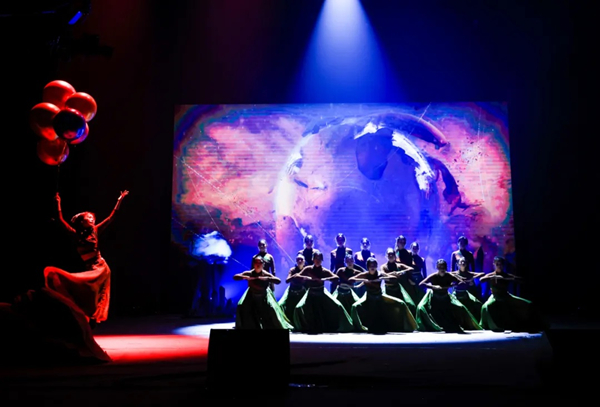
 0 Comment(s)
0 Comment(s) Print
Print E-mail China.org.cn, November 14, 2024
E-mail China.org.cn, November 14, 2024
The second Fishing Fortress Science Fiction Awards awarded 1 million yuan ($138,250) in prize money across 42 categories to honor the nation's leading sci-fi writers, professionals and masters, including Han Song and Francesco Verso.

A sci-fi performance is staged by students of Taishan College of Science and Technology during the Fishing Fortress Science Fiction Awards ceremony held in Tai'an, Shandong province, Nov. 9, 2024. [Photo courtesy of Taishan College of Science and Technology]
This year's Fishing Fortress Science Fiction Awards were sponsored by Taishan College of Science and Technology and organized by Penglai Science Fiction College, which was established in July 2021, along with Chongqing College of Mobile Communication's Fishing Fortress Science Fiction College. This nonprofit initiative recognizes outstanding contributions in sci-fi writing, translation, publishing, education, media and art.
The Fishing Fortress Science Fiction Awards were initiated by the China New Business School Group, a private education investment company. Its chairman, Peng Hongbin, stated that his goal is to cultivate well-rounded young people who not only excel in their specialties but also develop imagination, discovery and creativity.
Zhang Fan, founder of the Fishing Fortress Science Fiction Awards and the Science Fiction Academy, emphasized that science fiction offers humanity a new framework for the future and imagination.

Han Song receives the sci-fi master achievement award on stage during the Fishing Fortress Science Fiction Awards ceremony held in Tai'an, Shandong province, Nov. 9, 2024. [Photo courtesy of Taishan College of Science and Technology]
At the award ceremony on Nov. 9, prominent Chinese sci-fi writer Han Song received the prestigious sci-fi master achievement award, the highest honor, along with a prize of 600,000 yuan. His contemporary, Liu Cixin, won the same award in Chongqing last year.
The awards committee praised Han as a writer with a strong sense of humanism and a belief in the limitless possibilities of the future. He has been creating since the 1980s, and his works, marked by a distinctive style and a deep understanding of China's social changes, have shaped a unique Chinese sci-fi landscape. In addition to his writing, he has made significant contributions to the development of China's sci-fi community by mentoring younger generations and participating in various industry organizations.
Other notable awards included the best novel award, which went to Tianrui Shuofu for "Once Upon a Time in Nanjing." Jiang Bo's "The Cyber Peach Blossom Spring" won best novella, while Chi Hui's "The Stars That Do Not Dream" took home the award for best short story. The best new star award was presented to Lu Hang.
In the international category, R. F. Kuang's "Babel" won best novel, Arkady Martine's "Rose/House" took home the best novella award, and Naomi Kritzer's "The Year Without Sunshine" was recognized as the best novelette. Kritzer also won the best short story award for "Better Living Through Algorithm." Gabriela Damián Miravete received the best new international star award.
Additionally, the ceremony recognized publishers, translators, editors, teachers, artists, and media professionals with various awards. Teachers and students also showcased specially created stories, dramas, and impressive performances during the event.

Sci-fi artist Zhao Enzhe (center) and cosplayers pose for a photo on the red carpet before the Fishing Fortress Science Fiction Awards ceremony held in Tai'an, Shandong province, Nov. 9, 2024. [Photo courtesy of Taishan College of Science and Technology]
The winners of the achievement awards category received the highest tribute from attendees. Yang Feng, founder and CEO of the Chinese sci-fi brand Eight Light Minutes Culture, was honored with the sci-fi publisher achievement award. Li Guangyi, a professor at Chongqing University, received the sci-fi educator achievement award. Zhao Enzhe won the sci-fi artist achievement award, while San Feng was recognized with the sci-fi promoter achievement award. Li Keqin was awarded the sci-fi translator achievement award, and Yan Feng, a professor at Fudan University, received the academy award. Italian sci-fi writer and publisher Francesco Verso was honored with the Marco Polo Award for his extensive efforts in promoting Chinese sci-fi globally.
Xie Chenghong, executive vice president of Taishan College of Science and Technology, stated that the development of sci-fi initiatives reflects national progress. He pledged that the institution would continue to offer students new growth opportunities and unique educational value, further advancing sci-fi education.

Organizers and winners of the second Fishing Fortress Science Fiction Awards pose for a photo on stage after the award ceremony in Tai'an, Shandong province, on Nov. 9, 2024. [Photo courtesy of Taishan College of Science and Technology]
More than 100 sci-fi insiders and over 800 teachers and students participated in the award show and other affiliated activities, which spanned nearly a week and included forums, book signings, a sci-fi art exhibition, film screenings, a cosplay event, and even a barbecue.
Dong Renwei, a respected sci-fi and popular science writer, activist, and co-founder of the Chinese Nebula Awards, emphasized that the development of China's sci-fi industry must focus on cultivating top Chinese sci-fi writers and original works. He advocated for using Eastern culture as a foundation to create uniquely Chinese sci-fi that serves all of humanity and enhances China's cultural soft power.
Next year's Fishing Fortress Science Fiction Awards will be held at Jinzhong College of Information, according to Zhang Ran, dean of the Taiko Science Fiction Academy, which was also established by the China New Business School Group.
"Today's sci-fi education is precisely meant to innovate traditional education. Therefore, sci-fi-themed schools and academies should persist," said Wu Yan, a sci-fi scholar, writer, and professor at the Southern University of Science and Technology. He also suggested that the development of the sci-fi industry should balance model-driven and content-driven approaches, promote "Elon Musk-style" innovations, and engage with mainstream literature. For global audiences, he emphasized that Chinese sci-fi should convey more messages that provide a sense of peace and stability to people worldwide.